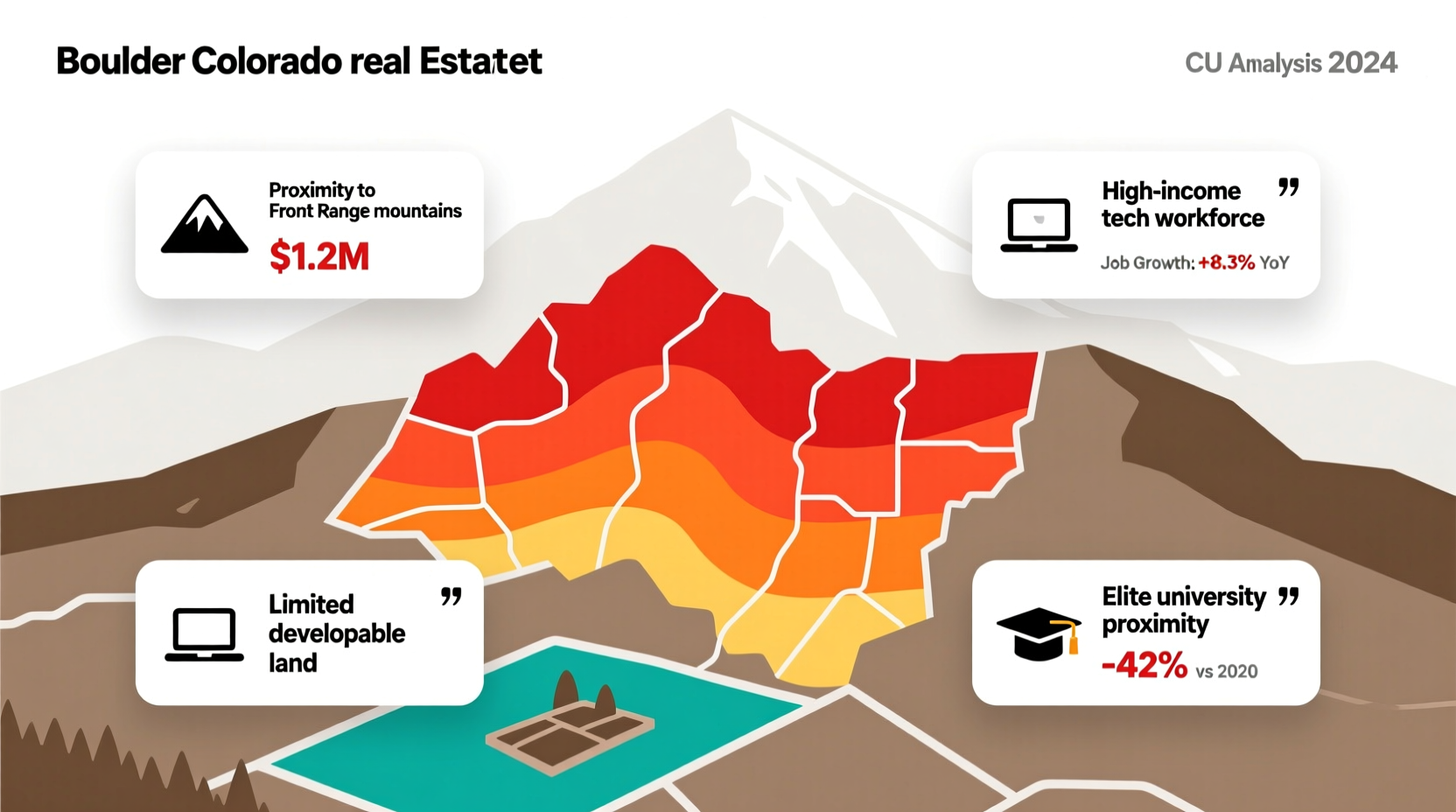Boulder, Colorado, consistently ranks among the most expensive mid-sized cities in the United States. In 2024, its median home price exceeds $900,000, and rental costs are nearly double the national average. While the city offers world-class outdoor access, a vibrant cultural scene, and proximity to top-tier research institutions, these advantages come at a steep financial cost. The reasons behind Boulder’s high prices are not accidental—they stem from a combination of geographic constraints, economic forces, demographic trends, and policy decisions that have evolved over decades.
Understanding why Boulder is so expensive requires looking beyond surface-level assumptions about “desirability.” It’s a complex interplay of limited land, high demand from affluent professionals, strict development regulations, and a self-reinforcing cycle of exclusivity. Below, we break down the key drivers shaping Boulder’s economy and real estate market in 2024.
1. Geographic Constraints Limit Expansion

Boulder sits nestled against the foothills of the Rocky Mountains, with protected open space preserving much of its western and southern borders. This natural beauty is one of the city’s biggest draws—but it also severely restricts available land for development. Unlike sprawling cities like Phoenix or Dallas, Boulder cannot expand outward to meet housing demand.
The city has preserved over 45,000 acres of open space through voter-approved funding since 1967. While this commitment to conservation ensures environmental integrity and recreational access, it effectively caps population growth and limits new construction. As a result, supply cannot keep pace with demand, pushing prices upward.
2. High Demand from Educated, High-Income Residents
Boulder is home to the University of Colorado Boulder, a major research university that attracts students, faculty, and tech entrepreneurs. The presence of CU, combined with proximity to the Denver tech corridor, has turned Boulder into a magnet for highly educated professionals—particularly in biotech, software, and clean energy sectors.
According to U.S. Census data, over 70% of Boulder residents hold a bachelor’s degree or higher—the highest percentage of any city in the nation. These residents typically earn well above the state average, giving them strong purchasing power. With many able to work remotely post-pandemic, demand for Boulder’s quality of life has only intensified.
This influx of wealth creates a feedback loop: high earners drive up housing prices, which in turn makes the city less accessible to lower- and middle-income households, reinforcing socioeconomic homogeneity.
“Boulder isn’t just expensive because it’s pretty—it’s expensive because it’s become a destination for a very specific, high-income demographic that can afford to bid up prices.” — Dr. Lena Torres, Urban Economist, University of Colorado
3. Strict Zoning and Development Regulations
Boulder has some of the most restrictive land-use policies in Colorado. Single-family zoning dominates large portions of the city, and new multi-family developments face lengthy approval processes, community opposition, and environmental reviews. While these rules aim to preserve neighborhood character and reduce traffic congestion, they stifle density and limit affordable housing options.
In recent years, the city has attempted to ease restrictions—allowing accessory dwelling units (ADUs) and relaxing parking requirements—but progress is slow. Even when developers propose high-density projects near transit corridors, legal challenges and public referendums often delay or kill them.
As of 2024, Boulder averages fewer than 300 new housing units per year, far below the estimated 800 needed to keep pace with population growth. This chronic underbuilding fuels competition and inflates prices across all property types.
4. Cost of Living Beyond Housing
Housing is the largest expense, but Boulder’s overall cost of living is elevated across categories. Groceries, utilities, transportation, and services all carry premium price tags compared to nearby cities like Longmont or Louisville.
One reason is labor costs: service workers in Boulder require higher wages to afford local housing, and businesses pass those costs to consumers. Additionally, many retailers cater to a wealthier clientele, offering organic, locally sourced, or specialty goods at premium prices.
| Expense Category | Boulder (2024) | U.S. Average | Difference |
|---|---|---|---|
| Median Home Price | $925,000 | $430,000 | +115% |
| Avg. Rent (1BR) | $2,400 | $1,300 | +85% |
| Grocery Costs | 30% above avg | Baseline | +30% |
| Utility Costs | 15% above avg | Baseline | +15% |
5. Lifestyle Appeal and Cultural Capital
Boulder’s reputation as a progressive, health-conscious, and environmentally aware city adds intangible value that translates into economic premiums. The city consistently ranks among the fittest, happiest, and most sustainable in the country. Its downtown pedestrian mall, farmers markets, craft breweries, and trail network create a lifestyle that many are willing to pay a premium for.
This cultural capital attracts not just residents but also businesses and investors. Startups choose Boulder for talent retention, and venture capital flows into local innovation hubs. The city’s brand itself has become a driver of real estate appreciation.
A mini case study illustrates this trend: In 2022, a tech executive from Silicon Valley relocated to Boulder after a short-term rental stay. Despite finding limited inventory, they paid $1.1 million for a modest 1,800-square-foot home in the Newlands neighborhood—20% above asking—citing access to trails, top schools, and a “like-minded community” as decisive factors.
Checklist: Evaluating Affordability in High-Cost Cities Like Boulder
- Assess total cost of living, not just housing
- Research job market alignment with your skills
- Factor in commute times if considering nearby towns
- Understand local zoning and future development plans
- Explore alternative housing options (ADUs, co-ops, etc.)
- Consult property tax rates and utility estimates
- Consider long-term resale and appreciation trends
FAQ
Is Boulder’s housing market expected to cool in 2024?
While national mortgage rates have stabilized slightly, Boulder’s market remains tight due to low inventory. Prices are unlikely to drop significantly in 2024, though the pace of appreciation may slow. Experts predict continued competition for well-located properties, especially near downtown or open space.
Are there more affordable neighborhoods near Boulder?
Yes. Towns like Lafayette, Louisville, and Longmont offer more competitive pricing while remaining within a 20–30 minute commute. Some remote workers opt for Lyons or Nederland, though those areas come with trade-offs in terms of infrastructure and winter accessibility.
Can local policies fix Boulder’s affordability crisis?
Potential solutions include expanding transit-oriented development, legalizing duplexes and triplexes in single-family zones, and accelerating ADU permitting. However, change is constrained by voter resistance to density and environmental review requirements. Incremental progress is underway, but systemic affordability remains a long-term challenge.
Conclusion: Navigating Boulder’s High-Cost Reality
Boulder’s high cost in 2024 is not a temporary spike—it’s the result of deep structural forces. Geography limits expansion, affluent demand outpaces supply, and policy inertia slows reform. For those drawn to its unmatched quality of life, the financial barrier is real and growing.
Yet understanding these factors empowers better decision-making. Whether you’re considering relocation, investment, or advocacy for change, recognizing the roots of Boulder’s expense is the first step toward navigating it wisely. The city’s beauty and culture are undeniable, but sustainability depends on balancing exclusivity with inclusivity in the years ahead.









 浙公网安备
33010002000092号
浙公网安备
33010002000092号 浙B2-20120091-4
浙B2-20120091-4
Comments
No comments yet. Why don't you start the discussion?